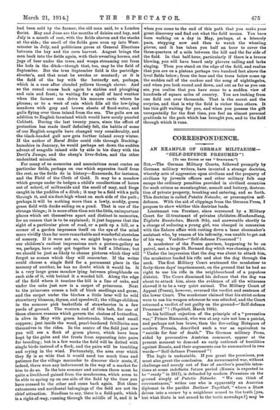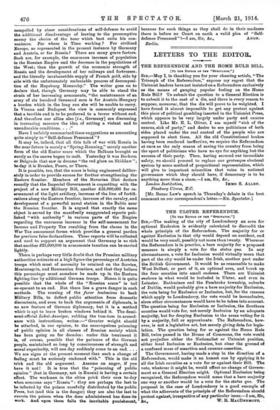CORRESPONDENCE.
AN EXAMPLE OF GERMAN MILITARISM- " SELF-DEFENCE PRESUMED "1
IT0 rem EPITOS or ram 0 Sescerros.'1
Sin,—The German Military Courts, followed promptly by German military writers, have invented a strange doctrine, whereby acts of aggression upon civilians and the property of civilians by juvenile officers and other military folk may escape the ordinary penalties provided in civilized countries for such crimes as manslaughter, assault and battery, destruc- tion of private property, breaking and entering, and so forth. This doctrine is called Putatiro Notwehr, or presumptive self- defence. With the aid of clippings from the German Press, I propose to show whither this doctrine leads.
Lieutenant von Forstner, since sentenced by a Military Court for ill-treatment of privates (Boldaten-Misshandlung, Titgliche Bundschau, March 9th), and answerable shortly to a charge of seducing a young girl, was charged in connexion With the Zabern affair with cutting down a lame shoemaker's assistant who, by reason of his infirmity, was unable to get out of his way. Verdict—" Self-defence Presumed" 1 A musketeer of the Posen garrison, happening to be on patrol, met a large St. Bernard dog which was chasing a rabbit. "Under the impression that the dog was about to attack him, the musketeer loaded his rifle and shot the dog through the neck. The first Military Court sentenced the musketeer to forty-three days' imprisonment, on the ground that he bad no right to use his rifle in the neighbourhood of a populous district, The Court dismissed his defence that the dog was about to attack him, since the evidence of all the witnesses showed it to be a very quiet animal. The Military Court of Appeal (Posen), however, reversed the verdict and sentence of the lower Court. The musketeer claimed that his strict orders were to use his weapon whenever he was attacked, and the Court returned a verdict of not guilty on the ground—' Self-defence Presumed" " ! ( Tageblait, March 10th).
In his brilliant rejection of the principle of a "preventive war," Prince Bismarck, who was at any rate not less a patriot, and perhaps not less brave, than the fire-eating Hotspurs of modern Prussia, described such a war as equivalent to "suicide for fear of death." The German military Press, aided by provocative Austrian comment, appear at the present moment to demand an early outbreak of hostilities against Russia, and their arguments can be summarized in two words—" Self-defence Presumed " The logic is undeniable. If you grant the premisses, you must also grant the conclusion. An unwarranted war, without challenge and merely out of fear of another's possible inten- tions at some indefinite future period (Russia is expected to be "ready " in 1917), is defended by modern Prussians on the ground simply of Putatiu Notwehr. "We can think of circumstances," writes one who is apparently an Austrian diplomat in the pacifist Berliner Tageblatt," where a State driven into a corner by a neighbour armed to the teeth [yes, but what State is not armed to the teeth nowadays ?) may be
compelled by sheer considerations of self-defence to avoid the additional disadvantage of leaving to the presumptive enemy the choice of the hour which best snits his con- venience. For whom is Time working ? For civilized Europe, as represented in the present instance by Germany and Austria, or for Russia ? There are many grave factors. Such are, for example, the enormous increase of population in the Russian Empire and the decrease in the populations of the West; then the growth of the economic strength of Russia and the development of her railways and fortresses, and the literally inexhaustible supply of French gold, side by side with the unfortunately undeniable process of decomposi- tion of the Hapsburg Monarchy." The writer goes on to declare that, though Germany may be able to stand the strain of her increasing armaments, "the maintenance of an army of six hundred thousand men is for Austria-Hungary a burden which in the long run she will be unable to carry. In Vienna and Budapest the view is commonly expressed that a terrible end is to be preferred to a terror without end. And therefore our allies also [is., Germany] are discussing in increasing measure the idea of setting a violent end to unendurable conditions. . . ."
Have I unfairly summarized these suggestions as amounting quite simply to "Self-defence Presumed" ?
It may be, indeed, that all this talk of war with Russia in the near future is merely a "Spring-Running," merely another form of the old Easter scare which the Balkans brought as surely as the snows began to melt. Yesterday it was Borknm or Belgrade that saw in dreams "the red glare on Skiddaw "; to-day it is Breslau, Posen, or Thom.
It is possible, too, that the scare ie being engineered deliber- ately in order to provide excuse for further strengthening the Eastern frontier. Members of the Bavarian Diet declare roundly that the Imperial Government is coquetting with the project of a new Military Bill, another R25,000,000 for re- armament of the light artillery, increase of the line of fortifi- cations along the Eastern frontier, increase of the cavalry, and development of a powerful naval station in the Baltic near the Russian frontier. It is argued that exactly the same Object is served by the manifestly exaggerated reports pub- lished "with authority" in various parts of the Empire regarding the enormous increase in the self-assessment for Income and Property Tax resulting from the clause in the War Tax assessment forms which provides a general pardon for previous false declarations. These reports will be collected and used to support an argument that Germany is so rich that another fl25,000,000 in armaments taxation can be carried lightly.
There is perhaps very little doubt that the Prussian military authorities estimate at a high figure the percentage of Austrian troops which must of necessity be retained on the Servian, Montenegrin, and Roumanian frontiers, and that they believe this percentage must somehow be made up in the Eastern ighting.line by additional German troops. Hence it is quite possible that the whole of the "Russian scare" is toil eo.operant to an end. But there lies a grave danger in such methods. The rousing of the furor teutonieus to back Military Bills, to deflect public: attention front domestic discontents, and even to back the arguments of diplomats, is no new feature of German diplomacy, but it is a method which is apt to leave broken windows behind it. The demi- Loleal-dnzeiger, rubbing the tom-torn in accord- ance with instructions, writes :—" Greater weight should be attached, In our opinion, to the unscrupulous poisoning of public opinion in all classes of Russian society which ha, been going on for decades: under this treatment it is, of course, possible that the patience of the German people, maintained so long by consciousness of strength and moral superiority, will one day suddenly come to an end. . . We see signs at the present moment that such a change of feeling must be seriously reckoned with." This is the old trick and the old argument. Assume an anger, if you have it not! It is true that the "poisoning of public opinion" (but in Germany, not in Russia) is having a certain effect. The workmen in the cities prick their ears to-day when someone says " Russia " : they are perhaps the last to be infected by the poison carefully distributed by the public Press, but (and this is the danger) they are also the last to excrete the poison when the dose administered has done its work. And upon them falls the inevitable puniehment,
because for such things as they shall do in their madness there is before no Court on earth a valid plea of "Self- defence Presumed" I—I am, Sir, &a., Alton.











































 Previous page
Previous page